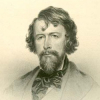Nathaniel Parker Willis

Nathaniel Parker Willis
Nathaniel Parker Willis, also known as N. P. Willis, was an American author, poet and editor who worked with several notable American writers including Edgar Allan Poe and Henry Wadsworth Longfellow. He became the highest-paid magazine writer of his day. For a time, he was the employer of former slave and future writer Harriet Jacobs. His brother was the composer Richard Storrs Willis and his sister Sara wrote under the name Fanny Fern...
NationalityAmerican
ProfessionAuthor
Date of Birth20 January 1806
CountryUnited States of America
Blessed are the joymakers.
How like a mounting devil in the heart rules the unreined ambition.
It is the month of June, The month of leaves and roses, When pleasant sights salute the eyes And pleasant scents the noses.
Your love in a cottage is hungry, Your vine is a nest for flies- Your milkmaid shocks the Graces, And simplicity talks of pies! You lie down to your shady slumber And wake with a bug in your ear, And your damsel that walks in the morning Is shod like a mountaineer.
If there is anything that keeps the mind open to angel visits, and repels the ministry of ill, it is human love.
One lamp — thy mother’s love — amid the stars Shall lift its pure flame changeless, and before The throne of God, burn through eternity - Holy — as it was lit and lent thee here.
Vulgarity is more obvious in satin than in homespun.
The soul of man createth its own destiny.
The perfect world, by Adam trod, Was the first temple--built by God-- His fiat laid the corner stone, And heaved its pillars, one by one.
The children of the poor are so apt to look as if the rich would have been over-blest with such! Alas for the angel capabilities, interrupted so soon with care, and with after life so sadly unfulfilled.
The taste forever refines in the study of women.
Wisdom, sits alone, topmost in heaven: she is its light, its God; and in the heart of man she sits as high, though groveling minds forget her oftentimes, seeing but this world's idols.
The smallest pebble in the well of truth has its peculiar meaning, and will stand when man's best monuments have passed away.
But he who never sins can little boast Compared to him who goes and sins no more!